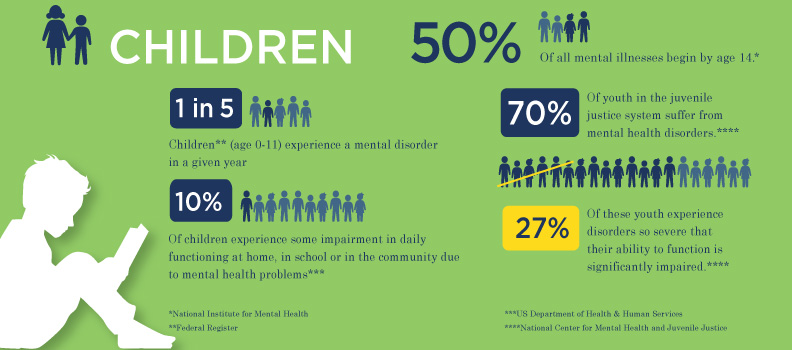Lesson 15: Mental Health

The emotional well-being of young children is directly tied to the emotional functioning of their caregivers and the families in which they live. ~National Scientific Council on the Developing Child
Learning Outcomes
Upon completion of this lesson's material, students will be able to:
- Describe the Teaching Pyramid and Social Skills curricula
- Discuss the importance of mental health for children and caregivers in early childhood education
- Strategize ways to promote self-care and minimize burnout
Teaching
- Read Chapters 5-8 (pgs. 72-114) in The Early Years Matter
- Watch Challenging Behaviors in Young Children
Early Childhood Mental Health – quality of the emotional, behavioral, and social development in the early childhood years
Why is mental health important in early childhood education? Experiences in early childhood are important for building:
- Healthy brains
- Healthy family connections
- Friendships
- Language development
- Physical development
- Social development
- Emotional development
- School readiness
- Overall health
By age 3, more than half of the children in the US have had an adverse event, one-third have had more than one adverse event. An adverse event is an instance of something having a negative impact on mental well-being.
Mental stress can impact the ability to learn, plan, remember, and react. Stress responses might be enhanced or diminished and can change the way the nervous, immune, and hormone system react. Children can develop sleep and eating issues, physical ailments (stomach upset, headaches), and behavioral issues. Emotional and behavioral issues can impede normal development. Anxiety disorders and disruptive behaviors are most common.
According to the National Health Institute (reference below) - Mental health conditions and disorders don't only affect adults. Children and teens can experience mental health problems too. In fact, research has now shown that most mental disorders follow a developmental course that typically starts early in life. This is true not only of conditions such as autism and ADHD, which are well known for having onset in childhood, but also for mood, anxiety, and psychotic disorders. So, many people who suffer from depression, social phobia, obsessive compulsive disorder, bipolar disorder, or schizophrenia showed signs before they were 24 years old.
Like adults, children and teens can sometimes experience intense emotions as they get older or go through stressful or traumatic events in their lives. For example, it is common for children to feel anxious about school or friendships, or for teens to have short periods of depression after a death in the family.
Mental disorders are different. They can cause ongoing, severe symptoms that affect how a child feels, thinks, acts, and handles daily activities, such as going to school, sleeping, or eating. It is important to know the signs and seek help if needed.
Retrieved from the Mental Health Institute website at
http://www.nimh.nih.gov/health/topics/child-and-adolescent-mental-health/index.shtml
Self-care
Because the work we do can be exhausting, early childhood educators must also remember to take care of themselves. Burnout is a very real problem in the field. Educators put in long days and sometimes feel like they can never do enough. Some signs of burnout are exhaustion, negativity, anxiety, feeling overwhelmed, loss of creativity, and isolating self. It is important to be able to recognize and acknowledge burn out in self and co-workers. Some things you can do to combat burnout:
- Focus on the positive, even if it is minor
- Create realistic to do lists and celebrate their completion
- Accept there are things you cannot change
- Find a way to relax – take a walk or a class
- Watch a funny movie
- Try something new
- Leave your teaching at school – I used to have a 40 minute drive from the inner city child care I worked at. This was a great opportunity to decompress. I have heard of other educators that had a worry tree or bush either at their childcare site or at home. As they left for the day they would leave their worries there. It sounds silly but it is a concrete reminder to "leave it at work."
- Get plenty of sleep
- Talk to someone positive – it is important to be sure to not “vent” to a co-worker because that can influence their attitudes and may create a negative climate
- Celebrate teaching and children
To learn more about stress reducing strategies, read: How to Reduce Stress and Beat Burnout
Assessment
Lesson 15 Assignment
Research one of the websites on page 114 and answer the following questions IN DETAIL: - each question is worth 20 points each. To receive the full 20 points you must answer the questions in complete sentences, give specific examples and information and be thorough!!!!!!
- Which website did you chose? (no points but is mandatory for us to know what you are talking about in the other questions)
- What services do they provide? (consulting, trainings, etc.)
- What audience do they target? (a particular service agency, teachers, families, children etc.)
- What resources do they provide and who are they for? (free printouts? Webcasts? Etc.)
- What is their vision/mission statement?
- How would you use site service in your own classroom?
Lesson 15 Discussion A
Why do you think it is important for early childhood educators to incorporate self-care into their practices? Describe three activities you believe can help promote self-care and minimize burn-out.
Lesson 15 Discussion B
Share a resource from the website you explored that would be helpful for other early childhood educators to know about. You may NOT use a resource already shared it other posts.